Barn Door Photographs (As simple and as cheap as it can get....)
A barn door tracker is a simple device that has a camera mounted on a
board that is hinged like a door. The board that the camera sits on is moved by
turning a handle on a rod. The board is moved at the required rate (of 0.25 degrees
per minute) that is required to turn the camera in sync with the sky. The idea is
that you slowly turn the handle once per minute and the board (with your camera on top)
rotates 0.25 degrees per minute. It is in effect a cheap equatorial mount. For
details on constructing a barn door mount like the one I use click here.
Latest Photograph
Click for an enlarged view
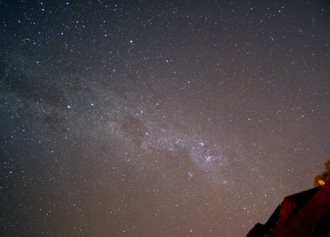
The Southern Cross and Milky Way over my house photographed from the barn door using a
Canon 350D. The orange glow of light pollution visible.
|
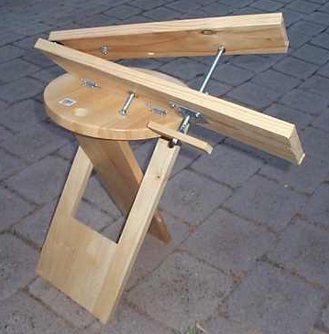
Barn Door Mount
(Hinged for the Southern Hemisphere)
|
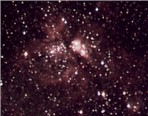
Eta Carina Nebula
captured CCD video using the barn door
|
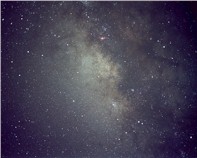
Sagittarius in the Milky Way
captured on 35 mm film using the barn door
|
More Examples...
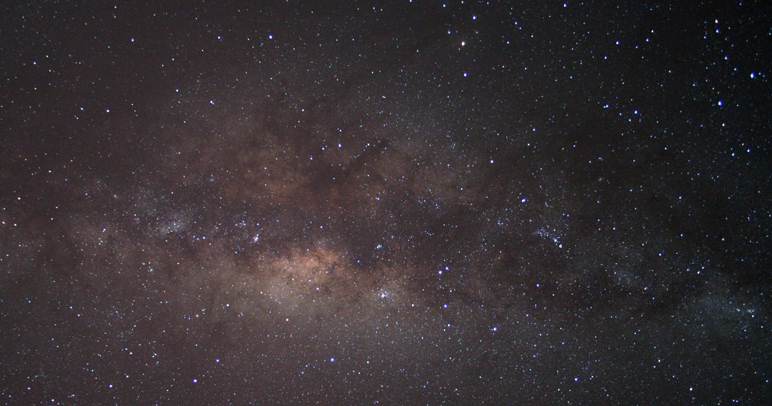
Click the above image to view a close up.
Canon 350D 18mm lens 2 Mins f3.5 ISO 800 Noise Reduction On
All of the above images had to be shrunk down to fit on the screen. The image
below is a 100% resolution (pixel for pixel) section cut from the original photo.
The images produced by the Canon 350D are huge, at a whopping 3456 pixels by 2304 pixels.
That's more pixels than can fit onto your computer screen, so to see a full photo I
have to shrink it down for you. In the image below instead of shrinking it down I
cut out a small section that is 772 pixels wide so it fits neatly on the web page
below.
The cropped image below is cropped (cut) from the area visible at
centre-left of the image above.
Cropping the image has the effect of giving you a closeup of the Lagoon
nebula (M8), which is clearly visible in the pink nebulosity (right of centre). Also
the Omega (Swan M17) nebula can be seen as the small pink area on the left. The
brown backdrop across the whole image is the light from billions of stars lighting up the
galactic centre's exhaust (i.e. the fine carbon particles and other dust) that's been
created by and is now recycling back through the massive star factories... The dust
is so thick it obscures the bright central core of our galaxy. The slightly
brighter whiter patch of stars seen at centre-left (near M17) is actually a thinner gap in
the dust in our arm of the galaxy that lets us peer through to see the stars in the next
inner arm of the galaxy. Good stuff.
Get yourself a barn door and whack a 35mm film or a DSLR camera on it.
Get going... You'll be glad you did.
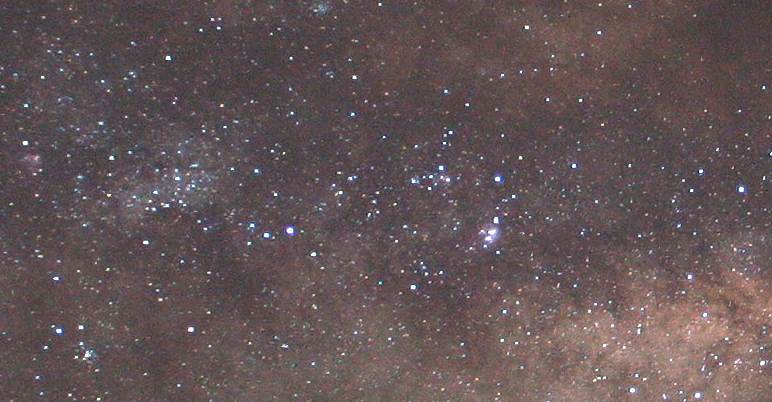
The Sagittarius Starfields (The Centre of the Galaxy)
Canon 350D 18mm 2 Mins f3.5 ISO 800 Noise Reduction on. Image cropped to
100% resolution.
<<<Back to Equipment
|






